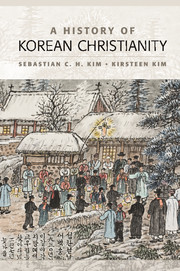Book contents
- Frontmatter
- Contents
- Illustrations
- Acknowledgements
- Abbreviations
- Maps
- Chapter 1 Introduction
- Chapter 2 Believers, Martyrs and Missionaries, 1592–1876
- Chapter 3 Evangelism, Patriotism and Revivalism, 1876–1910
- Chapter 4 Oppression, Resistance and Millennial Hope, 1910–1945
- Chapter 5 Liberation, Service and Divisions, 1945–1961
- Chapter 6 Growth, Thought and Struggle, 1961–1988
- Chapter 7 Missions, Reconciliation and Public Life, 1988–Present
- Glossary
- Bibliography
- Index
- References
Chapter 6 - Growth, Thought and Struggle, 1961–1988
Published online by Cambridge University Press: 05 March 2015
- Frontmatter
- Contents
- Illustrations
- Acknowledgements
- Abbreviations
- Maps
- Chapter 1 Introduction
- Chapter 2 Believers, Martyrs and Missionaries, 1592–1876
- Chapter 3 Evangelism, Patriotism and Revivalism, 1876–1910
- Chapter 4 Oppression, Resistance and Millennial Hope, 1910–1945
- Chapter 5 Liberation, Service and Divisions, 1945–1961
- Chapter 6 Growth, Thought and Struggle, 1961–1988
- Chapter 7 Missions, Reconciliation and Public Life, 1988–Present
- Glossary
- Bibliography
- Index
- References
Summary
South Korea in 1961 was still poor and heavily dependent on US aid. It had fallen badly behind the North in economic and technological development, and most people were mired in poverty. Chang Myon’s new government proved unstable, and Protestants called continually for Chang to step down (Park Chung-shin 2003:181). Fearful for national security, a group of colonels led by Park Chung-hee (Park Jeong-hui) deposed Chang and his government in a largely bloodless coup on 16 May 1961. Chang fled from the Blue House to the Carmelite Convent while trying in vain to contact the US embassy. From a Catholic point of view, Chang may have been a political martyr (T. J. Lee 2005:168), but the return to law and order was greeted with relief by many Koreans. The church reassessed its role in political life, and the Kyunghyang Shinmun, which had become virtually a mouthpiece of the Chang government, became independent of the church in 1962 (D. Baker 1997:150).
Park, a Buddhist, treated the main religions impartially. He won strong backing from Christians for his staunch anti-Communist stance and the Holy See was the first foreign state to recognise his government. Park knew the importance of Christian support and sought cooperation for his ambitious plans for industrialisation. During his rule, Park encouraged ethnic nationalism in order to develop a national spirit of self-reliance or jaju, which had much in common with the Juche philosophy of North Korea (Shin Gi-wook 2006:100–106; Wells 1990:163). Park was popular enough to win elections in 1963, 1967 and 1971, but he increasingly relied on military force and the terror created by the Korean Central Intelligence Agency (KCIA) to hold on to power. He was to preside over massive economic growth in the 1960s and 1970s and great improvements in rural standards of living, but this was at great cost to human and civil rights.
- Type
- Chapter
- Information
- A History of Korean Christianity , pp. 207 - 262Publisher: Cambridge University PressPrint publication year: 2014

